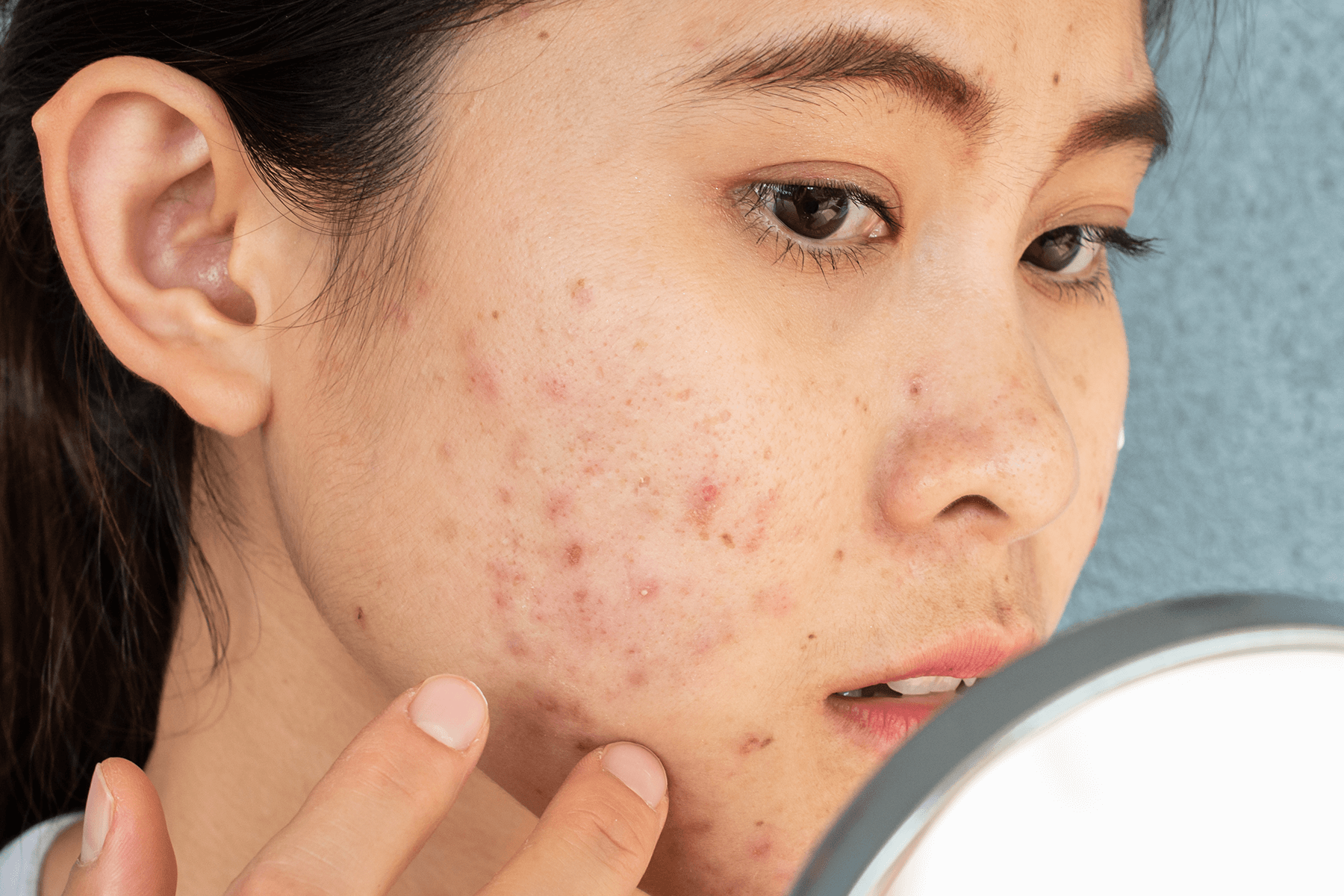The+Source
Table of Contents
Yay—you’re having a baby! That’s awesome. You’ve likely got a million questions right now about everything. (What should I eat? Do I need a midwife? What’s a unique, but not weird, baby name?) Allow us to take one thing off your mind. Here’s your ultimate guide to what to expect (in your skin) when you’re expecting.
Common sense caution: While this list is doctor-approved, everyone’s pregnancy experience is different. For that reason, you’ll want to run this—and all skincare plans—by your own MD first.
Change Is Inevitable
You’ve got a lot more hormones swirling around in your body now (shocker). And those new and different hormones can do new and different things, such as set off your sebaceous glands, resulting in acne flares. Or you may find you’re more sensitive to certain products than you used to be, whether it’s to the way they smell or just how they react with your skin. And hormones are one of the causes of melasma, diffuse brown patches on the face often called “the mask of pregnancy.” But wait, there’s more! Since hormones often impact pigment production (see: melasma), they can also be the catalyst for changes in existing moles, which become darker or larger during pregnancy. And then there are stretch marks. Hormones make it more likely you’ll end up with those—along with a baby—once your pregnancy ends.
Why “pregnancy-safe skincare” is a thing
At first, you may be thinking, “Well, hormones are going to do all these things to my face and body, but I already have plenty of products in my skincare arsenal to combat all the potential disruptions.” Yes, but…skincare products are absorbed by the skin. (Otherwise, you’d be walking around with a visible layer of moisturizer on your face, for one thing.) And sometimes those ingredients make it into the bloodstream. Now this, in itself, is not a reason to freak out (regardless of whether or not you’re with child). But if you’re already making lifestyle modifications to turn your body into a baby-ready temple, such as adopting an organic diet and swapping out your cleaning products for chemical-free versions, it makes sense to follow through on the skincare front to ensure that anything that does make it into your bloodstream and get passed your growing bundle of joy is a thing you’re OK with being there. After all, certain ingredients (like chemical sunscreens) are recommended for use by those six months and older—a milestone your bun in the oven has yet to reach.
Skincare Ingredients to Avoid During Pregnancy
Along with the list of foods you may be avoiding during pregnancy or while nursing, there are skincare ingredients that you should probably avoid when expecting. It is important to remember that some of what goes into your body during this time may also make its way to your baby—so it is always better to play it safe and know which skincare ingredients you should avoid from the start.
Retinol:
This vitamin A derivative has been scrutinized more than the love triangle of Brad, Jen, and Angelina. But the one subject it hasn’t been studied on? Those who are pregnant or breastfeeding. Isotretinoin (aka Accutane), an oral form of vitamin A prescribed to treat cystic acne, is known to cause birth defects. So avoiding its topical cousin, retinol, makes sense—even if retinol has been proven to do everything from build collagen and reduce fine lines to diminish dark spots and wipe out breakouts.
Try instead: Bakuchiol
Bakuchiol comes from the seeds and/or leaves of the Psoralea Corylifolia or “Babchi” plant. Like retinol, bakuchiol stimulates cellular turnover, reducing the look of fine lines and wrinkles. (However, due to its molecular structure, it’s not a “plant version of retinol,” as it’s often called.) Plus, bakuchiol is an anti-inflammatory, and it strengthens skin’s moisture barrier, which ultimately reduces irritation and transepidermal water loss (TEWL).
Benzoyl peroxide and salicylic acid:
Although the American College of Obstetricians and Gynecologists says that topical benzoyl peroxide and topical salicylic acid are safe to use during pregnancy, some doctors suggest avoiding both ingredients during this time. (And some dermatologists don’t like benzoyl peroxide for anyone, full stop.) Many find benzoyl peroxide unnecessarily irritating when there are equally effective acne treatments that don’t have the same side effects. And oral salicylic acid has been shown to increase the risk of intracranial bleeding, leading many to avoid the topical formulation as well.
Try instead: Lactic and Mandelic acids
The large molecular size of these two alpha-hydroxy acids (AHAs) means they absorb slowly into skin and don’t penetrate as deeply as other AHAs (such as glycolic acid), so they’re less irritating. However, like all AHAs, lactic and mandelic acids exfoliate skin by dissolving the “glue” that holds dead cells to the skin’s surface. Removing these cells helps keep pores clear and reduce the incidence of breakouts.
Hydroquinone:
Actually, a lot of dermatologists now tell all their patients, not just the pregnant ones, to nix this ingredient that works by decreasing the number of melanin-making cells in your skin (thus reducing the appearance of discoloration). For one thing, it can actually cause hyperpigmentation to get worse in darker skin tones. But there’s also been a lot of debate about the overall safety of the ingredient itself. Although it’s still available by prescription, hydroquinone was pulled from the over-the-counter market in 2020 as part of the Coronavirus Aid, Relief, and Security (CARES) Act. So, like, not a great sign.
Try instead: vitamin C
Vitamin C does so many helpful things, it’s like the Swiss army knife of skincare. In addition to being an antioxidant that also builds collagen, vitamin C helps reduce hyperpigmentation (safely) by blocking the production of melanin.
Chemical sunscreens:
There is no way around it—you need SPF every day, pregnant or not. (Although if you’re pregnant, the risk of melasma makes sunscreen even more of a must.) But studies have shown that common chemical sunscreen ingredients (like oxybenzone, avobenzone, homosalate, and octocrylene) can get absorbed into the bloodstream after just one application, even making their way into breast milk. That’s enough to make anyone seek out an alternative.
Try instead: physical sunscreen
There are two physical UV-blocking ingredients: titanium dioxide and zinc oxide. Both of these minerals work by sitting on top of skin and deflecting the sun’s rays. (Conversely, chemical sunscreens sink into skin and then absorb UV like a sponge, convert it to heat, and release it.) Physical sunscreens are less irritating, in general, than their chemical counterparts, so they’re always recommended for sensitive skins.
All-Clear List
You can never go wrong with any of the following skincare ingredients:
Light-emitting diodes (LEDs): Most widely available in red and blue, LED skincare is a safe, painless light-based treatment for stimulating collagen formation (red light) and reducing acne outbreaks (the blue version).
Hyaluronic acid: Not an acid in the traditional sense, hyaluronic acid is a molecule present in the connective tissue throughout our bodies. It’s able to absorb up to 1,000 times its weight in water, making it hyper-hydrating. And well-moisturized skin is plump, happy skin.
Niacinamide: Also known as vitamin B3, Niacinamide is prized in skin care for its ability to reduce inflammation and regulate oil production simultaneously. Oh, and it helps destroy dark spots and wipe out wrinkles.
Goji berry: This fruit is a hybrid ingredient—both adaptogen and superfood. An excellent source of hydration, Goji berries also reinforce the skin barrier and reduce hyperpigmentation, which results in a brighter, more even skin tone.
Turmeric: An adaptogen, turmeric has antioxidant, as well as anti-inflammatory, properties, thanks to its Curcumin component. This means it’s an effective treatment for redness, acne (and subsequent scarring), puffiness—even eczema and rosacea. It also increases circulation and decreases dryness.







